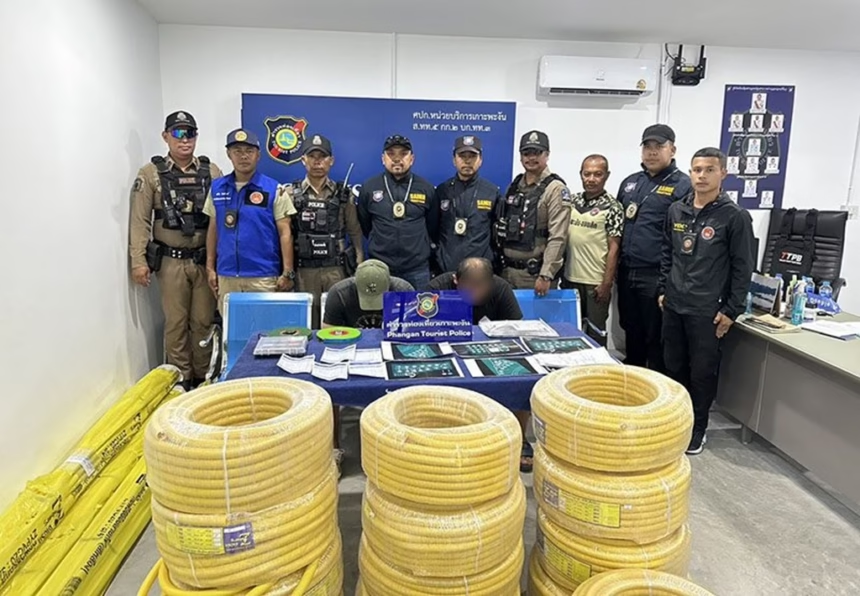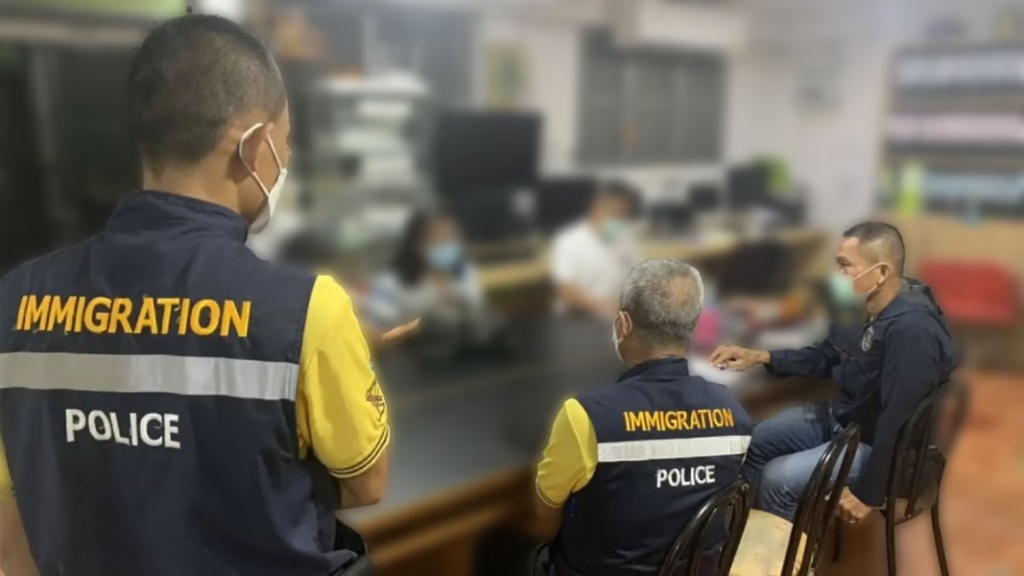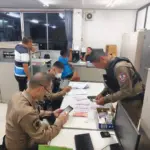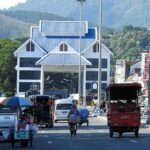KOH PHANGAN – Tourist Police on Koh Phangan arrested two foreign nationals accused of working as electrical contractors without required permits, according to a statement released Saturday. The action is part of ongoing efforts to stop foreigners from taking jobs reserved for Thai citizens in the busy island destination.
The operation took place on November 8 and involved Tourist Police Station 5, Koh Phangan Police, and district officials, following an order from Tourist Police Commissioner Pol. Lt. Gen. Saksira Puek-am.
Officers identified the suspects as Mr. Viacheslav, 29, a Ukrainian citizen, and Mr. Ramis, 26, from Azerbaijan. They were detained at a work site in Si Thanu village, Moo 8, Koh Phangan Sub-district. Police said the pair had been under watch for some time.
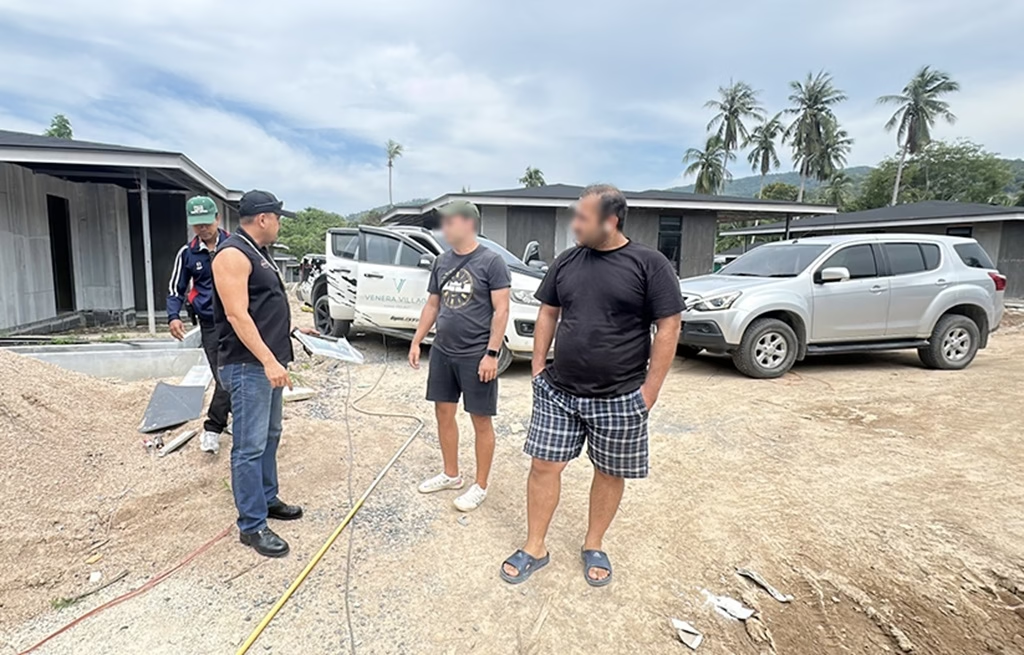
Officers stopped them after seeing them drive a white Ford Ranger to buy electrical supplies, including flexible conduit, then deliver the materials to the site. When confronted, the men denied any wrongdoing and grew hostile. They allegedly shouted that they were tourists and threatened to sue the officers involved.
A Thai foreman at a nearby project, identified as Mr. A, told police the two men were hired as direct contractors for electrical installation. He said they were hired by the project owner and showed up at the site daily.
Police presented what they described as strong evidence, including 14 rolls of yellow conduit, 40 junction boxes, 100 pieces of rigid pipe, wiring, and power tools found in their storage area. After that, the suspects admitted to working illegally.
They confessed to taking electrical and interior fit-out jobs in the area without permits and said they had completed several projects before.
Both men were charged with jointly operating an electrical contracting business without authorization and working as foreigners without valid work permits. They were transferred to Koh Phangan Police Station for further legal action.
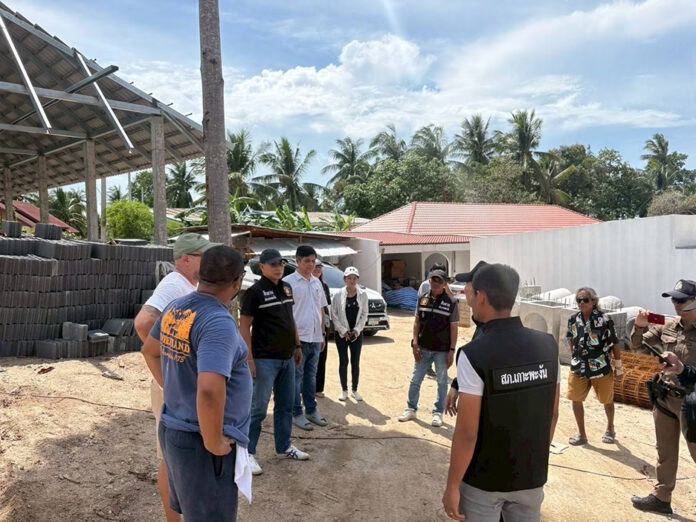
In a related operation, police officers raided four sites tied to a French-managed villa venture on Koh Phangan. The case involves claims of using Thai nominees to run property and unlicensed hotel operations.
The November 7 raids included teams from the Surat Thani Provincial Police, Koh Phangan Police Station, the Immigration Bureau, Tourist Police, and the Koh Phangan District Office.
Investigators said the French group leased land from Thai owners under 30-year contracts, divided the plots, and built villas. These were then sold through sublease rights priced between 3 million and 7 million baht, about $92,610 to $216,090 each.
Some buyers lived in the homes. Others paid the French operators a 20 percent fee to manage and rent the villas. Police intelligence estimated rental and management income of at least 200 million baht per year.
Officers seized business documents for review and are interviewing those involved to check for hotel licensing violations and the use of illegal nominee structures. Police said these actions are part of a wider crackdown on unauthorized foreign-run businesses across major tourist areas in Surat Thani province.
Penalties for Foreigners Working Illegally on Koh Phangan
Working in Thailand without the right permission includes working with no valid work permit, working in a banned job category, or using the wrong visa (such as a tourist visa). The main rules come from the Alien Working Act B.E. 2551 (2008) and the Royal Decree on the Management of Foreign Workers’ Employment B.E. 2560 (2017), with updates through 2025.
These laws protect Thai employment and regulate foreign labor. Enforcement tightened in 2025, especially in tourism areas, digital nomad hubs, and restricted roles like tour guiding and vending, with actions such as Operation X-Ray leading to many arrests and deportations.
Penalties include fines, prison, and administrative actions like deportation and bans. The outcome depends on the type of violation, whether it is a first offense, involvement in protected jobs (for example, tour guide, hairdresser, or manual labor like construction), or ties to smuggling or trafficking.
Key Penalties for Foreign Workers
| Violation Type | Fine (THB) | Imprisonment | Other Consequences | Notes/Source |
|---|---|---|---|---|
| Working without a work permit (general) | 5,000 to 50,000 | Up to 5 years | Deportation, 2-year ban on re-entry or new work permits | Applies to most cases, with graduated fines under the 2017 decree. Enforcement increased in 2025 in tourism hotspots. |
| Working in prohibited or restricted occupations (for example, tour guide, street vending, motorbike rental) | 2,000 to 100,000 | Up to 5 years | Deportation, blacklisting for future work authorization | Over 39 restricted jobs are reserved for Thai nationals. Reports cite 4,400+ arrests from Oct 2024 to Jun 2025. No permit can be issued for these roles. |
| Failing to present a work permit when asked (if legally allowed to work) | Up to 5,000 | None | None stated | Administrative fine. Keep a copy of the permit with you. |
| Illegal entry or smuggling for work | Up to 50,000 | Up to 5 years | Immediate deportation, potential trafficking-related charges | Treated as serious under emergency rules. Employers can be billed for repatriation costs. |
| Working outside the permit’s scope (wrong job, employer, or location) | 5,000 to 50,000 | Up to 5 years | Deportation, 2-year work ban | Common in freelance or digital nomad situations. Raids were reported in 2025 in Chiang Mai and island areas. |
Additional Details
- Deportation process: Most cases involve detention for up to 30 days, then removal at the worker’s expense. Voluntary departure within 30 days can avoid jail, but fines still apply. Re-entry bans start at 2 years. Repeat offenders risk permanent blacklisting.
- Recent trends in 2025: The Destination Thailand Visa (DTV) for digital nomads does not allow local work. Violations bring quick action. High season crackdowns, including in October 2025, focus on illegal guides tied to a rise in Chinese tourism. Chiang Mai alone reported more than 45 deportations in mid-2025.
- Limited exceptions: Some roles are allowed without a standard permit under government MoUs or for international organizations. These are uncommon and require prior approval.
- How to work legally: Secure a Non-Immigrant B visa first, then apply for a work permit with the Department of Employment. Permits are typically valid for 1 year and can be renewed. BOI-promoted companies can use the One-Stop Service Center. Illegal work also weakens labor protections, though courts may still order payment of unpaid wages in dismissal disputes.
Regulations change. Verify current rules with official sources like the Ministry of Labour hotline (1506) or thailand.go.th.




